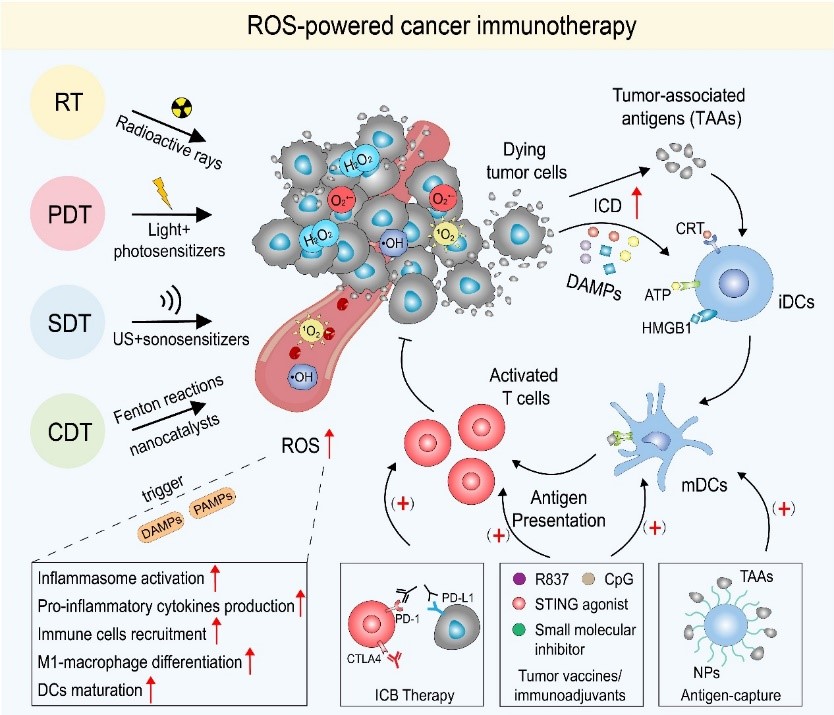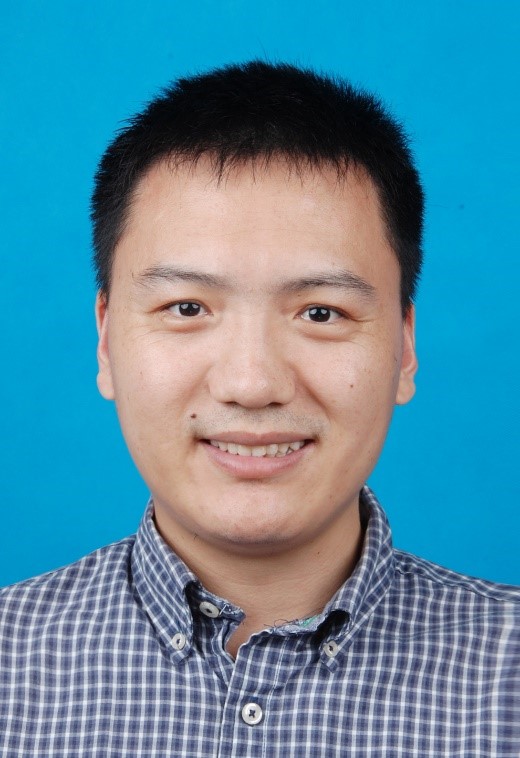Professors Dawei Ding and Zhiyuan Zhong published a review article on tumor immunotherapy in the Journal of Controlled Release
Recently, Prof. Dawei Ding, together with Prof. Zhiyuan Zhong and Prof. Chao Wang of the Institute of Functional Nano & Soft Materials (FUNSOM), published a review article entitled “Reactive oxygen species-powered cancer immunotherapy: Current status and challenges” in the Journal of Controlled Release. In recent years, immunotherapy has emerged as a promising and clinically effective approach to cancer treatment. Reactive oxygen species (ROS) have become a research hotspot of cancer immunotherapy as they can not only directly reduce tumor burden but also trigger immune responses by inducing immunogenic cell death (ICD), activating the host’s anti-tumor immune responses. Furthermore, ROS can be facilely generated through various tumor treatment modalities such as chemotherapy, photodynamic therapy, sonodynamic therapy, and chemodynamic therapy (Figure 1). However, the ICD-induced anti-tumor immune response is largely downplayed by the immunosuppressive signals and dysfunction of effector immune cells within the tumor microenvironment (TME). ROS, in combination with tumor vaccines, immunoadjuvants, STING agonists, and immune checkpoint inhibitors (ICIs) can effectively enhance the efficacy of tumor immunotherapy, which has shown to potently inhibit primary tumors, distal tumor, recurrence, and metastasis, and simultaneously reduce the immune-related toxicity and adverse events. This review introduced ROS-powered cancer immunotherapy, summarized innovative strategies to boost ROS-based cancer immunotherapy, and discussed the challenges in terms of clinical translation and future perspectives.
This work was supported by the National Key R&D Plan of China (2021YFB3800900), the Priority Academic Program Development (PAPD) of Jiangsu Higher Education Institutions, the open fund of the State Key Laboratory of Pharmaceutical Biotechnology of Nanjing University and the Science and Technology Program of Suzhou City. The graduate students in the College of Pharmaceutical Sciences, Mengying He and Mengyuan Wang are co-first authors of the paper.

Figure 1. Schematic illustration of the role of ROS in cancer immunotherapy.
Reference:
Mengying He, Mengyuan Wang, Tao Xu, Mengyao Zhang, Huaxing Dai, Chao Wang,* Dawei Ding,* Zhiyuan Zhong,* Reactive oxygen species-powered cancer immunotherapy: Current status and challenges. Journal of Controlled Release 2023, 356, 623-648.https://doi.org/10.1016/j.jconrel.2023.02.040.
Corresponding author:

Dawei Ding, a Professor and Ph.D. supervisor at Soochow University, focuses on drug delivery systems (DDSs) research using materials with excellent biocompatibility, like proteins and fatty acids, especially in the field of synergistic tumor therapy. The activation of the body’s immune responses to tumors is realized through chemotherapy, phototherapy, and likewise, and enhanced efficacy and synergistic treatment are facilitated through immunotherapeutic agents, such as immune checkpoint inhibitors and immune adjuvants. In addition, his group is also interested in the research of microneedles- and microfluidics-based DDSs, such as nanoemulsions, carrier-free nanomedicines, and drug-loaded microspheres. Prof. Ding has published ~20 academic papers in relevant fields, among which he is the first/co-first/corresponding author in some first-class journals, such as Advanced Materials, ACS Nano, Chemical Engineering Journal, Journal of Controlled Release, Advanced Healthcare Materials, and others. He also contributed to an English monograph. Moreover, his several patents related to drug-loaded albumin nanoparticles have been authorized in the United States, China, Japan, and other countries, and he has won scientific research awards such as the China Patent Excellence Award (2020) and First Prize of Taizhou Science and Technology Progress Award (2015). In addition, he serves as a reviewer for top and well-known journals like Advanced Functional Materials, Biosensors, Polymers, and Pharmaceutics.